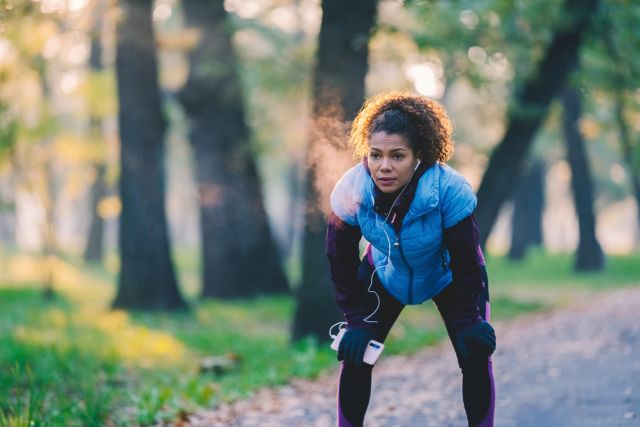Updated on April 10, 2024.
Most people should try to get about 30 minutes of physical activity most days of the week, and do some exercises or moves to strengthen their muscles at least two days each week. It can be hard to do this consistently—even when it's sunny and warm outside. During winter, when it's colder, darker, and colds and the flu are spreading, it may be even harder. And if you think you're getting sick, you may not feel motivated or have the energy to exercise or move around. Could it help—or would it be harmful? Here’s what you need to know about exercising during cold and flu season.
Can exercise protect me from a cold or flu—or make me more susceptible?
Getting regular, moderate exercise tends to be a prescription for good health in general, and it could lower your risk of getting sick. Physical activity reduces the release of stress hormones, which may protect against illness. It also raises your body temperature and increases white blood cell circulation, potentially helping your body detect and fight infections.
But sometimes too much of a good thing can be harmful. Excessive exercise may make you more vulnerable to viruses. This is because long bouts of intense physical activity can stress your immune system, weakening it for several hours afterward. So, be extra-careful to avoid germs during this time.
What about working out in the cold?
Cold or rainy weather does not raise your chances of getting sick. In general, it’s safe to exercise in lower temperatures as long as you’re properly dressed. If you do head out:
- Dress in layers to avoid overheating.
- Avoid cotton clothing, which retains moisture and may make you colder once you start sweating.
- Opt for synthetic fabric, such as polypropylene, which wicks away moisture.
- Cover your head, neck, hands, and feet properly.
If I'm sick, when should I take a break from exercise?
Germs spread more easily inside, especially in crowded indoor spaces with no open windows or doors. If you are sick, it is best to avoid public areas or indoor spaces where other people may be around, such as a community center or local gym.
For exercise at home or outdoors, you can move your body as you feel able, or well enough to do. It is usually safe to exercise as long as you haven’t been diagnosed with a serious illness and your symptoms are above the neck, such as a runny nose, nasal congestion, sneezing, or minor sore throat. Try not to overdo the workout, though—it may worsen your symptoms and, in some cases, lengthen the illness. If you're feeling unwell, stick to light-to-moderate exercise, such as walking or some body weight exercises, like sit ups or arm raises, until you are feeling better.
If you have been diagnosed with a more serious illness, you may want to avoid strenuous activity until your healthcare provider (HCP) says it's okay. You may also want to take it easy for a while if you have the following symptoms:
- Fever
- Wet cough
- Gastrointestinal symptoms, such as vomiting or diarrhea
How can I avoid germs at the gym to avoid getting sick?
Even though many public spaces and fitness centers clean common areas and equipment regularly, germs may remain on things like weights, floor mats, water fountains, doorknobs, and light switches. Most germs won't make you sick, but it's wise to be cautious and be sure to avoid touching your face with unclean hands, and wash your hands well and often with soap and water.
Try these other tips to help avoid germs:
- Use your own water bottle to avoid the water fountain.
- Shower or wash your hands with antibacterial soap before and after exercising in a public space
- Avoid touching your eyes, nose, and mouth.
- When possible, stay at least 6 feet from other people.
- If you are using gym equipment, clean it before and after use. This will also leave it clean for the next person.
Working out during cold and flu season may help you stay strong and healthy and could even lower your risk of becoming ill. But when you’re sick, be sure not to overdo it. Stay mindful of catching—and spreading—unwanted germs.







